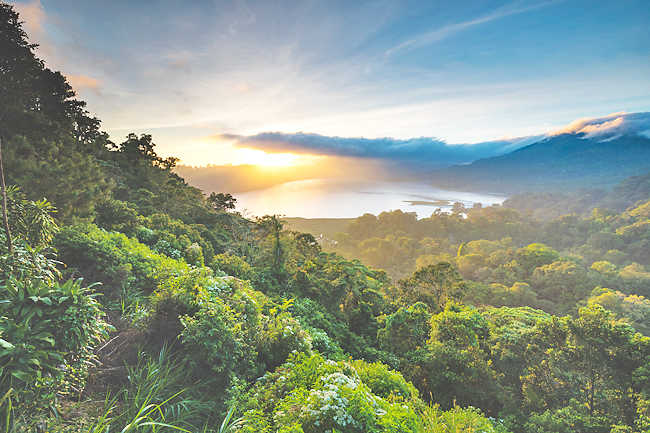Azlan Othman
Forests offer a vast array of products that people use on a daily basis, having a great potential to significantly contribute to economic diversification initiatives, through the production of timber and non-timber forest products, including non-extractive activities such as ecological tourism.
This was said by Permanent Secretary at the Ministry of Primary Resources and Tourism (MPRT) Hajah Tutiaty binti Haji Abdul Wahab in her keynote address at a recent webinar entitled, ‘Forests and Sustainable Production and Consumption’, held in conjunction with the International Day of Forests 2022.
However, she added that on the environmental perspective, forests are critical habitats for biodiversity and are essential for life on Earth, providing a wide range of ecosystem services, including supporting climate regulation, food production, water supply and air purification, are important to human well-being and survival, as well as provide opportunities for recreation, education, and cultural enrichment.
Hence, Hajah Tutiaty added, sustainable forest management (SFM) is the key to healthy forests and healthy societies. “It is important for us in the government sector to put in place the proper control and monitoring tools to avoid over exploitation and identify the balance between efficient utilisation and environmental conservation to meet the needs of the current and future generations.”
The permanent secretary highlighted that unsustainable production and consumption are the common threads that run through the three planetary crises: the climate crisis; the biodiversity and nature crisis; and the pollution and waste crisis.
Relentless extraction of the Earth’s resources will give a devastating impact on the natural world, propelling climate change, destroying nature, and raising pollution levels.
To address this, the 2030 Agenda for Sustainable Development Goals (SDGs), adopted by all United Nations (UN) member states in 2015, has included a goal (SDG 12) specifically on ‘Responsible Consumption and Production’. The goal comprises several targets and indicators, ranging from tracking policies and compliance with international standards; raising awareness and education; to measuring material use, recycling, waste management and clean energy.

Another relevant SDG goal is the SDG 15 on ‘Life on Land’. The goal emphasises the importance of protecting, restoring and promoting sustainable use of terrestrial ecosystems; sustainably managing forests; combatting desertification; halting and reversing land degradation; and halt biodiversity loss.
Hajah Tutiaty added that actions toward achieving the targets for each of these goals are important and become part of the solution in addressing the declining trend of the world’s forest areas.
“As we understand, it has been reported on the 2020 Global Forest Resources Assessment (FRA) that the world’s forest area continues to decrease, despite our understanding on the importance of forests and how dependable we are on them. The world has lost over 178 million hectares of forest since 1990, and for the year 2010 to 2020, there was a net loss of about 4.7 million hectares per year.”
However, it was also highlighted in the same report that Asia has the highest net gain of forest area in 2010-2020 of about 1.2 million hectares per year. This positive development can be attributed to the increase in protected areas, afforestation initiatives, the natural expansion of forests and most importantly, improvement of the forest management practices in the region.
“At national level, the Sultanate manages to maintain a high forest cover of about 72 per cent of its total land area, attributed to our strong conservation and protection efforts to our forests as well as our planting initiatives,” said Hajah Tutiaty.
“The forest is an important element that can directly contribute to the country’s initiative on economic diversification and gross domestic product (GDP) growth. Hence, the MPRT through Forestry Department is committed in the implementation of SFM to ensure continuous resources for timber industry of the country and for the benefits of the future generations.
“In view of our limited production forest area, striving to support the national economic diversification through incremental increase in GDP contribution is a major challenge in the forestry sector,” continued Hajah Tutiaty. “There is a need to revisit our logging and sawmilling industries and encourage companies to increase their production efficiencies and promote timber product diversification. As such, there is a need to upgrade our processes and investments in the use of advanced machineries and technologies.”
She added that the government shall ensure the continuous supply of timber for the country, through the establishment of tree plantations and enrichment planting of logged-over forests.
Planting trees have always been a popular initiative across the globe. Apart from supporting the forestry industry, it is also an important component in carbon sequestration and mitigating climate change.
At national level, the government has launched Brunei Darussalam National Climate Change Policy (BNCCP) in 2020, with the MPRT being the lead agency for Strategy 2, ‘Forest Cover’.
The strategy seeks to increase Brunei’s carbon sink through afforestation and reforestation programme with a target of planting 500,000 new trees by 2035.
Hajah Tutiaty said as a good practice, any action that leads to the removal of trees or forest clearance must be followed by planting trees to replace the trees that have been cut, whether it is due to logging industry; construction of infrastructures such as road and housing; or to clear space for agriculture.
Under the Green Protocol launched last year, in supporting the implementation of BNCCP, any developmental projects involving site clearing must follow the ‘Remove 1: Plant 1’ guideline – each removal of tree must be replanted with a new tree.
The MPRT, through the Forestry Department, continuously engages other government agencies, private sectors and non-governmental organisations in carrying out tree planting programmes every year.
“With our collaborative effort, 53,598 trees have been planted since the launching of the BNCCP,” shared Hajah Tutiaty. “Thus, through the implementation of this policy, it will help in maintaining our large national forest cover, which can be seen through satellite image.”






